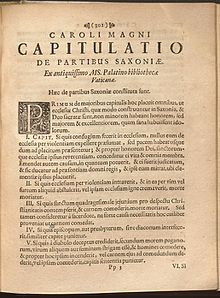Constitute sunt primum de maioribus capitulis.
- Hoc placuit omnibus, ut ecclesiae Christi, que modo construuntur in Saxonia et Deo sacratae sunt, non minorem habeant honorem sed maiorem et excellentiorem quam vana habuissent idolorum.
- Si quis confugiam fecerit in ecclesiam, nullus eum de ecclesia per violentiam expellere praesumat, sed pacem habeat usque dum ad placitum praesentetur, et propter honorem Dei sanctorumque ecclesiae ipsius reverentiam concedatur ei vita et omnia membra. Emends autem causam in quantum potuerit et ei fuerit iudicatum; et sic ducatur ad praesentiam domni regis, et ipse eum mittat ubi clementiae ipsius placuerit.
- Si quis ecclesiam per violentiam intraverit et in ea per vim vel furtu aliquid abstulerit vel ipsam ecclesiam igne cremaverit, morte moriatur.
- Si quis sanctum quadragensimale ieiunium pro despectu christianitatis contempserit et carnem comederit, morte moriatur; sed tamen consideretur a sacerdote ne forte causa necessitatis hoc cuilibet proveniat ut carnem commedat ..
- Si quis episcopum aut presbyterum sive diaconum interficerit, similiter capite punietur.
- Si quis a diabulo deceptus crediderit secundum morem paganorum, virum aliquem aut feminam strigam esse et homines commedere, et propter hoc ipsam incenderit / S. 69 / vel carnem eius ad commedendum dederit vel ipsam commederit, capitali sententiae punietur.
- Si quis corpus defuncti hominis secundum ritum paganorum flamma consumi fecerit et ossa eius ad cinerem redierit, capitae punietur.
- Si quis deinceps in gente Saxonorum inter eos latens non baptizatus se extra special voluerit et ad baptismum venire contempserit paganusque permanere voluerit, morte moriatur.
- Si quis hominem diabulo sacrificaverit et in hostiam more paganorum daemonibus obtulerit, morte moriatur.
- Si quis cum paganis consilium adversus christianos inierit vel cum illis in adversitate christianorum perdurare voluerit, morte moriatur; et quicumque hoc idem fraude contra regem vel gentem christianorum consenserit, morte moriatur.
- Si quis domino regi infidelis apparuerit, capitali sententia punietur.
- Si quis filiam domini sui rapuerit morte morietur.
- Si quis dominum suum vel dominam suam interficerit, simili modo punietur.
- Si vero pro his mortalibus criminibus latenter commissis aliquis sponte ad sacerdotem confugerit et confessione data ageri poenitentiam voluerit, testimonio sacerdotis de morte excusetur.
- De minoribus capitulis consenserunt omnes. Ad unamquamque ecclesiam curte et duos mansos terrae pagenses ad ecclesiam recurrentes condonant, et inter centum viginti homines, nobiles et ingenuis similiter et litos, servum et ancillam eidem ecclesiae tribuant.
- Et hoc Christo propitio placuit, ut undecumque census aliquid ad fiscum pervenerit, sive in frido sive in qualecumque banno et in omni redibutione ad regem pertante, decima pars ecclesiis et sacerdotibus reddatur.
- Similiter secundum Dei mandatum praecipimus, ut omnes decimam partem substantiae et laboris suis ecclesiis et sacerdotibus donent: tam nobiles quam ingenui similiter et liti, iuxta quod Deus unicuique dederit christiano, partem Deo reddant.
- Ut in dominicis diebus conventus et placita publica non faciant, nisi forte pro magna necessitate aut hostilitate cogente, sed omnes ad ecclesiam recurrant ad audiendum verbum Dei et orationibus vel iustis operibus vacent. Similiter et in festivitatibus praeclaris Deo et ecclesiae conventui deserviant et secularia placita demittant.
- Similiter placuit his decretis inserere, quod omnes infantes infra annum baptizantur; et hoc statuimus, ut si quis infantem intra circulum anni ad baptismum offerre contempserit sine consilio vel licentia sacerdotis, si de nobile generi fuerit centum viginti solidos fisco conponant, si ingenuus sexaginta, si litus triginta.
- Si quis prohibitum vel inlicitum coniugium sibi sortitus fuerit, si nobilis solidos sexaginta; si ingenuus triginta, si litus quindecim.
- Si quis ad fontes aut arbores vel lucos votum fecerit aut aliquit more gentilium obtulerit et ad honorem daemonum commederet, si nobilis fuerit solidos sexaginta, si ingenuus triginta, si litus quindecim. Si vero non habuerint unde praesentaliter persolvant, ad ecclesiae servitium donentur usque dum ipsi solidi solvantur.
- Iubemus ut corpora christianorum Saxanorum ad cimiteria ecclesiae deferantur et non ad tumulus paganorum.
- Divinos et sortilegos ecelesiis et sacerdotibus dare constituimus./S. 70 /
- De latronibus et malefactorihus, qui de una comitatu ad alium confugium fecerint, si quis eos receperit in suam potestate et septem noctibus secum detenuerit, nisi ad praesentandum, nostrum bannum solvat. Similiter si comis eum absconderit et ad iustitiam faciendam praesentare noluerit et ad hoc excusare non potest, honorem suum perdat.
- De pignore: ut nullatenus alterum aliquis pignorare praesumat; et qui hoc fecerit, bannum persolvat
- Ut nulli hominum contradicere viam ad nos veniendo pro iustitia reclamandi aliquis praesumat; et si aliquis hoc facere conaverit, nostrum bannum persolvat
- Si quis homo fideiussorem invenire non potuerit, res illius in forbanno mittantur usque dnm fideiussorem praesentet. Si vero super bannum in domum suum intrare praesumpserit, aut solidos decem aut unum bovem pro emendatione ipsius banni conponat, et insuper unde debitor exstitit persolvat. Si vero fideiussor diem statutum non observaberit, tunc ipse tantum damni incurrat quantum manus sua fideiussoris exstitit; illegal autem qui debitor fideiussori exstitit duplum restituat, pro eo quod fideiussorem in damnum cadere permisit.
- De praemiis et muneribus: ut munera super innocente nullus accipiat; et si quis hoc facere praesumpserit, nostrum bannum solvat. Et si, quod absit, forte comis hoc fecerit, honorem suum perdat.
- Ut universi comites pacem et concordiam ad invicem habere studeant; et si forte inter eos aliqua discordia aut conturbium ortum fuerit, aut nostrum solatium vel perfectum pro hoc non demittant.
- Si quis comitem interficcrit vel de eius morte consilium dederit, hereditas illius ad partem regis eveniat et in ius eius redicatur.
- Dedimus potestatem comitibus bannum middle infra suo ministerio de faida vel maioribus causis in solidos LX; de minoribus vero causis comitis bannum in solidos XV constituimus.
- Si cuilibet homini sacramcntum debet aliquis, aframeat illum ad ecclesiam sacramenta ad diem statutum; et si iurare contempserit, fidem faciat, et solidos quindecim componat qui iactivus apparuit, et deinceps causam pleniter emendare faciat.
- De periuris, secundum legem Saxonorum sit.
- Interdiximus ut omnes Saxones generaliter conventus publicos nec faciant, nisi forte missus noster de verbo nostro eos congregare fecerit; sed unusquisque comes in suo ministerio placita et iustitias faciat. Et hoc a sacerdotibus consideretur, ne aliter faciat.
|
